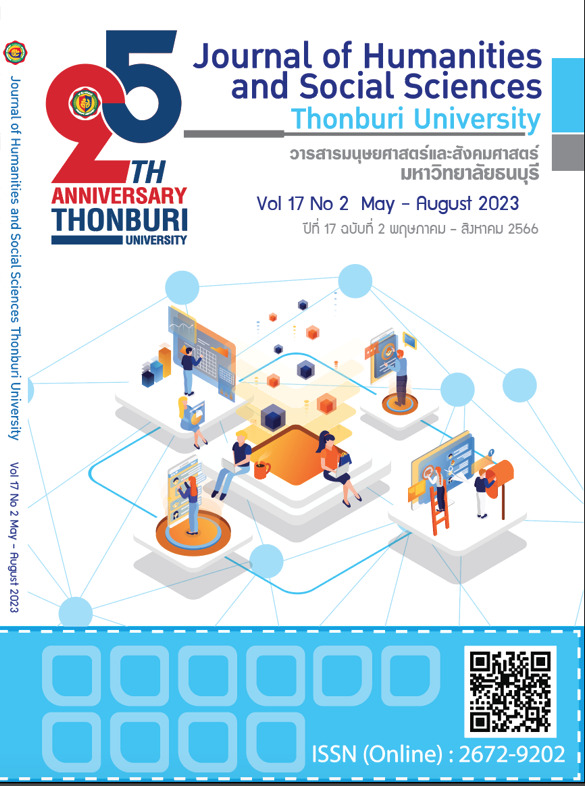ปัจจัยเชิงสาเหตุที่ส่งผลต่อความสำเร็จของผลการดำเนินงานเชิงนวัตกรรมของบุคลากรใน สถาบันอุดมศึกษากลุ่มเบญจมิตรในประเทศไทย
คำสำคัญ:
นวัตกรรมในที่ทำงาน, การจัดการองค์ความรู้, นวัตกรรมองค์กร, องค์การแห่งการเรียนรู้, ผลการดำเนินการเชิงนวัตกรรมบทคัดย่อ
บทความนี้มีวัตถุประสงค์ 1) เพื่อศึกษาปัจจัยเชิงสาเหตุ 2) เพื่อศึกษาอิทธิพลของปัจจัยเชิงสาเหตุ และ 3) เพื่อสร้างแบบจำลองของปัจจัยเชิงสาเหตุที่ส่งผลต่อความสำเร็จของผลการดำเนินงานเชิงนวัตกรรมของบุคลากรในมหาวิทยาลัย/วิทยาลัยในกลุ่มเบญจมิตร โดยมีขอบเขตด้านเนื้อหาประกอบไปด้วย ตัวแปรนวัตกรรมในที่ทำงาน
การจัดการองค์ความรู้ องค์การแห่งการเรียนรู้ นวัตกรรมมองค์กร, ผลการดำเนินการเชิงนวัตกรรม โดยการเก็บรวบรวมข้อมูลด้วยวิธีสำรวจ (Survey) และวิเคราะห์ทางสถิติด้วยสมการโครงสร้าง (Structural Equation Model : SEM)
ผลการศึกษาข้อมูลทั่วไปพบว่า ผู้ตอบแบบสอบถามจำนวน 420 ราย เป็นเพศหญิงร้อยละ 65.5 อายุอยู่ในช่วง 34 – 42 ปี ร้อยละ 30.3 สถานภาพทางครอบครัวเป็นโสดร้อยละ 49.5 การศึกษาอยุ่ในระดับปริญญาโทร้อยละ 72.3 เป็นอาจารย์ร้อยละ 84.0 มีประสบการณ์สอนระหว่าง 5 – 10 ปีคิดเป็นร้อยละ 40.5 จากการทดสอบสมมติฐานพบว่า นวัตกรรมในที่ทำงาน การจัดการองค์ความรู้ นวัตกรรมองค์กร และองค์การแห่งการเรียนรู้ส่งผลต่อผลการดำเนินการเชิงนวัตกรรม
จากการศึกษาครั้งนี้พบว่า 1) นวัตกรรมในที่ทำงาน การจัดการองค์ความรู้ องค์การแห่งการเรียนรู้ นวัตกรรมมองค์กรเป็นปัจจัยที่ใช้ในการอธิบายผลการดำเนินการเชิงนวัตกรรมได้อย่างมีนัยสำคัญทางสถิติ 2) การผูกพันต่องาน การจัดการองค์ความรู้ ความผูกพันองค์กรมีอิทธิพลต่อความสำเร็จของผลการดำเนินงานเชิงนวัตกรรม และ 3) แบบจำลองของปัจจัยเชิงสาเหตุที่ส่งผลต่อความสำเร็จของผลการดำเนินงานเชิงนวัตกรรมของบุคลากรในมหาวิทยาลัย/วิทยาลัยในกลุ่มเบญจมิตรประกอบไปด้วยตัวแปรการผูกพันต่องาน การจัดการองค์ความรู้ ความผูกพันองค์กรสามารถทำหน้าที่เป็นตัวแปรอิสระ
เอกสารอ้างอิง
กิตติมา ใจปลื้ม, นิลาวัลณ์ จันทะรังษี, อัมพล เจริญนนท์, เริงวิชญ์ นิลโคตร, วัยวุฒิ บุญลอย. (2564). การจัดการความรู้เพื่อพัฒนาสถานศึกษาให้เป็นองค์กรแห่งการเรียนรู้. วารสารมหาจุฬานาครทรรศน์, 8(6), 46-60.
ทวีศักดิ์ จินดานุรักษ์. (2559). การพัฒนาและประเมินความคิดสร้างสรรค์ในสถานศึกษา. วารสารศึกษาศาสตร์มหาวิทยาลัย บูรพา, 27(1), 1-14.
ประชาชาติธุรกิจออนไลน์. (2559). ผล PISA ประจานไทยเหลวทุกด้าน ทั้ง "หลักสูตร-ระบบสอน-วัดผล-ครู. สืนค้นเมื่อ 27 พฤศจิกายน 2565, จาก http://www.prachachat.net/news_detail.php?newsid=1481788873.
พื้นที่นวัตกรรมการศึกษา. (2564). พื้นที่นวัตกรรมการศึกษา. สืบค้นเมื่อ 27 พฤศจิกายน 2565, จาก https://www.edu sandbox.com
รักษ์รัศมี วุฒิมานพ. (2555). ลักษณะบุคคลและลักษณะงานที่มีความสัมพันธ์กับความผูกพันต่อองค์กรของพนักงาน. บัณฑิตวิทยาลัย มหาวิทยาลัยศรีนครินทรวิโรฒ.
วิชิต อู่อ้น. (2550). การวิจัยและการสืบค้นข้อมูลทางธุรกิจ. กรุงเทพฯ: พรินท์แอทมี (ประเทศไทย).
สำนักงานบริหารและพัฒนาองค์ความรู้. (2553). รายงานประจำปี 2553. สืบค้นเมื่อ 27 พฤศจิกายน 2565, จาก https://www.okmd.or.th/upload/pdf/Annual-Report-2553.pdf
สุดาพร ทองสวัสดิ์, ประชุม รอดประเสริฐ; และ นิรันดร์ จุลทรัพย์. (2563). สภาพปัญหาและแนวทางการพัฒนาความผูกพันต่อองค์การของอาจารย์ประจํามหาวิทยาลัยเอกชนในประเทศไทย. วารสารวิชาการ สถาบันเทคโนโลยีแห่งสุวรรณภูมิ, 6(2), 354-368.
อริสรา บุญรัตน์. (2557). การสร้างภาพลักษณ์โดยการสร้างความได้เปรียบในการแข่งขันของมหาวิทยาลัยเอกชนในประเทศไทย. Journal of Faculty of Education Pibulsongkram Rajabhat University. 1(2), 123 - 131.
Hrnote. (2020). Learn Generation Alpha (Gen Alpha) to prepare for the labor market of the future. Retrieved from https://th.hrnote.asia/tips/190805-generation-alpha/
Huang, H., & Li, F. (2021). Innovation climate, knowledge management, and innovative work behavior in small software companies. Social Behavior and Personality: an international journal, 49(4), 1-17.
Ishak, R., & Mansor, M. (2020). The relationship between knowledge management and organizational learning with academic staff readiness for education 4.0. Eurasian Journal of Educational Research, 20(85), 169-184.
Koseoglu, M. A., Bektas, C., Parnell, J. A., & Carraher, S. M. (2010). Strategic decision-making process in global supply chain. Management Decision, 48(4), 517-542.
Lopez, S. P., Peón, J. M. M., & Ordás, C. J. V. (2005). Human resource management as a determining factor in organizational learning. Personnel Review, 34(2), 177-191.
Manomaikul, P., Polsaram, P., & Bovornsiri, P. (2020). Factors affecting student satisfaction with online learning during the COVID-19 pandemic: A case study of Mahasarakham University. Kasetsart Journal of Social Sciences, 41(3), 376-383.
Mardani, A., Nikoosokhan, S., Moradi, M., & Doustar, M. (2018). The relationship between knowledge management and innovation performance. The Journal of High Technology Management Research, 29(1), 12-26.
Office of the Higher Education Commission. (2018). Key statistics of education sector, academic year 2017. Retrieved from https://www.mua.go.th/users/bestman/downloads/statistics/2560/statistic 2560_2.pdf
Purwanto, A. (2020). Effect of hard skills, soft skills, organizational learning and innovation capability on Islamic University lecturers’ performance. Systematic Reviews in Pharmacy.
Rad, H. F., Shahi, S., & Fazeli, A. (2021). The role of transformational leadership and knowledge management in organizational innovation of schools. Образование и саморазвитие, 16(1), 40-53.
Rehman, U. U., & Iqbal, A. (2020). Nexus of knowledge-oriented leadership, knowledge management, innovation and organizational performance in higher education. Business Process Management Journal.26(6), 1731-1758.
Scott, W. R., & Bruce, R. A. (1994). Determinants of innovative behavior: A path model of individual innovation in the workplace. The Academy of Management Journal, 37(3), 580-607.
Thai-English Youth Dictionary. (2564). University. Retrieved from https://www.thai-language.com/home/written/394.
Witoorut, J. (2019). The Role of Human Resource Management in Developing the Potential of Educational Institution Managers and Personnel. Journal of Research and Development in Education, 13(1), 1-10.
Translated Thai References
Boonrat, A. (2014). Image Creation through Competitive Advantage Building of Private Universities in Thailand. Journal of Faculty of Education Pibulsongkram Rajabhat University. 1(2), 123 - 131. (in Thai)
Education sandbox. (2021). Education sandbox. Retrieved 27 November 2565, from https://www.edusandbox.com (in Thai)
Jaiplume, K., Chantarangsi, N., Charoennon, A., Nilkote, R., & Boonloy, W. (2022). Knowledge management to develop the school to learning organization. Journal of MCU Nakhondhat, 8(6), 46-60. (in Thai)
Office of Knowledge Management and Development (2010). Annual Report 2010. Retrieved on November 27, 2022 from https://www.okmd.or.th/upload/pdf/Annual-Report-2010.pdf (in Thai)
Prachachatonline. (2016). PISA results condemn Thai people in all aspects, including "curriculum-teaching system-measurement-teachers." Retrieved 27 November 2565, from http://www.prachachat.net/news_detail.php?newsid=1481788873. (in Thai)
Sudaporn, T.; Prachoom, R.; & Niran, C. (2020). States, problems and developing guidelines of academic staff’s organization commitment of the private universities in Thailand. Journal of Suvarnabhumi Institute of Technology, 6(2), 354-368. (in Thai)
Taweesak, C. (2016). The development and evaluation of creativity in educational institutions. Journal of Education Burapha University, 27(1), 1-14. (in Thai)
Wichit U-on. (2007). Research and Business Information Search. Bangkok: Print at Me (Thailand). (in Thai)
Wutthimanop, R. (2012). Characteristics of people and job characteristics related to organizational commitment of employees. Graduate school Srinakharinwirot University. (in Thai)
ดาวน์โหลด
เผยแพร่แล้ว
รูปแบบการอ้างอิง
ฉบับ
ประเภทบทความ
สัญญาอนุญาต
ลิขสิทธิ์ (c) 2023 pratipat yamchutikirdmanee

อนุญาตภายใต้เงื่อนไข Creative Commons Attribution-NonCommercial-NoDerivatives 4.0 International License.
ผลงานที่ปรากฎในวารสารฉบับนี้เป็นลิขสิทธิ์เฉพาะส่วนบุคคลของผู้เขียนซึ่งต้องรับผิดชอบต่อผลทาง กฎหมายที่อาจเกิดขึ้นได้และไม่มีผลต่อกองบรรณาธิการ






